- Home
- Eric Nylund
Halo: Evolutions - Essential Tales of the Halo Universe
Halo: Evolutions - Essential Tales of the Halo Universe Read online
HALO®
EVOLUTIONS
NOVELS IN THE NEW YORK TIMES BESTSELLING HALO ® SERIES
Halo®: The Fall of Reach by Eric Nylund
Halo®: The Flood by William C. Dietz
Halo®: First Strike by Eric Nylund
Halo®: Ghosts of Onyx by Eric Nylund
Halo®: Contact Harvest by Joseph Staten
Halo®: The Cole Protocol by Tobias S. Buckell
HALO®
EVOLUTIONS
* * *
ESSENTIAL TALES OF THE HALO UNIVERSE
A TOM DOHERTY ASSOCIATES BOOK
NEW YORK
This is a work of fiction. All of the characters, organizations, and events portrayed in these stories are either products of the authors’ imaginations or are used fictitiously.
HALO®: EVOLUTIONS
Copyright © 2009 by Microsoft Corporation
All rights reserved.
Microsoft, Halo, the Halo logo, Xbox, and the Xbox logo are trademarks of the Microsoft group of companies.
A Tor Book
Published by Tom Doherty Associates, LLC
175 Fifth Avenue
New York, NY 10010
www.tor-forge.com
Tor® is a registered trademark of Tom Doherty Associates, LLC.
ISBN 978-0-7653-2399-6 (hardcover)
ISBN 978-0-7653-1573-1 (trade paperback)
First Edition: November 2009
Printed in the United States of America
0 9 8 7 6 5 4 3 2 1
CONTENTS
INTRODUCTION Frank O’Connor
BEYOND art by Sparth,
words by Jonathan Goff
PARIAH B. K. Evenson
STOMPING ON THE HEELS OF A FUSS Eric Raab
MIDNIGHT IN THE HEART OF MIDLOTHIAN
Frank O’Connor
DIRT Tobias S. Buckell
ACHERON-VII art by Sparth,
words by Jonathan Goff
HEADHUNTERS Jonathan Goff
BLUNT INSTRUMENTS Fred Van Lente
THE MONA LISA Jeff VanderMeer and Tessa Kum
ICON art by Robogabo,
words by Jonathan Goff
PALACE HOTEL Robt McLees
HUMAN WEAKNESS Karen Traviss
CONNECTIVITY art by Robogabo,
words by Jonathan Goff
THE IMPOSSIBLE LIFE AND THE POSSIBLE DEATH OF
PRESTON J. COLE Eric Nylund
THE RETURN Kevin Grace
FROM THE OFFICE OF DR. WILLIAM ARTHUR IQBAL
ACKNOWLEDGMENTS
HALO®
EVOLUTIONS
INTRODUCTION:
WHY SHORT STORIES?
BECAUSE THE Halo universe is almost as vast and boundless as the real thing. And because Halo fans enjoy a broad spectrum of flavors and moments from the games and the extended canon. In fact, no two Halo fans are quite the same. We have hard-core fans who only enjoy one game type, on one map, with one weapon. We have fans who are enthralled by the tactical exploits of UNSC commanders. We have fans who wish to explore the deepest mysteries of a forgotten civilization. We have fans who want to drop from orbit with the ODSTs. We have fans who view the entire canon through the lens of the Master Chief’s faceplate.
Moreover, we have fans who can’t wait years between novels to get their next fix, that next glistering nugget of data about their favorite part of the worlds Halo has created. Short stories allow us the luxury of sampling those flavors and moments. Like a box of chocolates, to borrow a Gumpian phrase.
We can dive in, visit the bridge of Admiral Cole’s latest command, or hide in an abandoned spacecraft with the life ebbing out of us. We can wander the desert of a distant world in the cloven shoes of an Elite. We can explore the ravenous appetites of the Gravemind through Cortana’s tortured gaze. And we can do all this in a single book.
The first anthology I ever read was called Great Space Battles. It assembled short stories built around completely unrelated illustrations, and wove together a universe from the art it represented. I remember thinking what a wonderful way to read: in bite-size chunks. We have the luxury of an already established fiction and a vast range of characters and worlds at our fingertips.
Some of these stories are short and sweet and will melt in your mouth. Others are heartier fare, but they’ll taste like a perfectly cooked chateaubriand. They’ll all add ingredients and menu items to the Halo table and they’ll all taste remarkably different.
The iron chefs catering this affair are a mixture of masters. We have stories from the Titans of Halo Fiction: Erics Nylund and Raab, Tobias S. Buckell, Robt McLees, and Fred Van Lente. And we have newcomers too: Karen Traviss, who has left an indelible mark on Star Wars fiction; Tessa Kum and Jeff Vander-Meer collaborate across an ocean and an international dateline; and B. K. Evenson, Jonathan Goff, and Kevin Grace bring some new ingredients. Even I’ve been in the kitchen, cobbling together something partway edible. I hope.
This anthology is certainly a smorgasbord and may be a lot to consume before we move back to the main course of novels, starting in 2010 with Greg Bear’s new Forerunner trilogy. But you guys have the intestinal fortitude.
Bon appétit.
Frank O’Connor
Redmond, Washington
September 2009
BEYOND
_____________
There is majesty here
Beyond reason
Beyond understanding
Vast in its implications
What wonders; offered around each new corner—
Over every skyward peak—
Or hidden deep; within in the shadows of each sunken
valley
The questions raised
In astonishment;
In fear—
If such glories can be divined, yet forgotten
Lost to time;
Strewn about the entirety of stars
What then are we—
Be us man,
Or be us monster
In light of knowledge, so vast—
So far beyond
Superior; even to our dreams
What matter, then, our petty confrontations
When weighed against the sins we sow
What matter, then, our fate amongst the cosmos, eternal
In light of the Halo; its luminous glow
PARIAH
* * *
B. K. EVENSON
PROLOGUE
_______________________
“Will you tell me your name?” asked Dr. Halsey. She made no move to squat down in front of the boy, to smile, to do anything at all to come down to his level. Instead she remained standing, her posture neither friendly nor threatening, but simply as neutral as she could make it. Her gaze was steady, interested.
The boy looked at her from across the room. He was only six but the boy’s gaze was just as steady as hers, though there was perhaps a trace of wariness in his eyes. Completely understandable, thought Dr. Halsey. If he knew why I was here there’d be more than just a trace. He held his body just as noncommittally as she held her own, though she could tell by the tightness in his neck that that might change any moment, without warning.
“You first,” the boy said, and then moved his mouth into something that could pass for a smile.
His voice was calm, as if he were used to being in charge of a situation. Not afraid, then. Not surprising, thought Dr. Halsey. If the report she’d read was correct, he’d managed to survive on his own, in the Outer Colonies on the planet Dwarka, on an illegal farm in the middle of a forest preserve one hundred kilometers from nowhere, for nearly three months a
fter his parents had died. Surviving under normal circumstances on a harsh world still in the process of being terraformed was hard enough. But for someone who was barely six years old it was inconceivable.
“I already know your name,” Dr. Halsey admitted. “It’s Soren.”
“If you knew, why did you ask?”
“I wanted to see if you’d tell me,” she said. Then she paused. “I’m Doctor Halsey,” she said, and smiled.
Soren didn’t smile back. She now saw more than a trace of suspicion in his gaze, suspicion that sat strangely in his face alongside his straw-colored hair and his pale blue eyes. “What kind of doctor?” he asked.
“I’m a scientist,” said Dr. Halsey.
“Not a sigh—, not a sigh—”
“No,” she said, and smiled. “I’m not a psychiatrist. You’ve been seeing a lot of psychiatrists, haven’t you?”
He hesitated just a moment, and then nodded.
“Because of your parents’ deaths?”
He hesitated, nodded again.
Dr. Halsey glanced at the holographic files displayed discreetly on the interior of her glasses. His mother had apparently succumbed to a planet-specific disease. Treatments were readily available, but a family living off the grid wouldn’t have been aware of that. Instead of reporting immediately to the planetary officials as was required by law, the boy’s parents had dismissed the symptoms as those of a cold and had kept working. A few days later, the mother was dead and the stepfather sick. Soren, perhaps because his younger immune system had adapted more readily to Dwarka, had never become ill. He had, according to his stepfather’s dying wish, buried the bodies of both of his parents, then continued to live on in their farmhouse until supplies were almost gone, finally setting out by foot to cross 112 kilometers of blue-gray forest and arrive at the beginning of authorized farmland.
Was she right to consider him for her team of Spartans? Certainly he was bright and resourceful. He was tough and clearly wouldn’t give up easily. But at the same time, what would it do to someone to go through that experience? Nobody knew how traumatized he was. Nobody knew for certain what it had done—and might still be doing—to him. Probably not even him.
“Why are you here?” he asked.
She looked at him and considered. There was no reason to tell him anything; she could simply do as she and Keyes had done with the others and make the decision for him, flash-clone him and kidnap him for, as she’d started telling herself, the greater good. But with the other children she’d in part assumed they wouldn’t understand. Here was a boy without parents who, despite being only six, had had to grow up fast, much faster than her other recruits. Could she tell him more?
“The truth is,” she said, “I came to see you.”
“Why?” he countered.
She returned his even gaze. Suddenly she made her decision. “I’m trying to decide if you’re right for something I’m working on. An experiment. I can’t tell you what it is, I’m afraid. But if it works in the way we hope it will you’ll be stronger and faster and smarter than you could ever imagine.”
For the first time, he looked slightly confused. “Why would you want to do something like that for me? You don’t even know me.”
She reached out and tousled Soren’s hair, was pleased when he didn’t flinch or shy away. “It’s not for you, exactly,” she said. “I can’t tell you much more. It won’t be easy; it’ll be the hardest thing you’ve ever done—even harder than what happened with your parents.”
“And what have you decided?” he asked.
“I’ve decided to let you be the one to decide,” she said.
“What if I say no?”
She shrugged. “You’d stay here on Dwarka. The planetary authorities would arrange a foster home for you.” Not much of a choice, she thought. He’s between a rock and a hard place. She wondered again if she wasn’t being unfair putting the choice on the boy.
“All right,” he said and stood up.
“All right what?” she said.
“I’m coming with you. When do we leave?”
LATER, BACK on board, when she spoke with Keyes, showed him the vid of her conversation with Soren, he asked, “You’re sure about this?”
“I think so,” she said.
He just grunted.
“As sure as I am of taking any of them,” she said. “At least he has a notion of what might happen to him.”
“That’s an awful lot to lay on a child,” said Keyes. “Even one who’s grown up fast.”
She nodded. Keyes was right, she knew. The terms for the test subject known as Soren were different from those of the others—he was coming into the program in a different way from the very beginning. She’d have to remember that and keep an eye on him.
ONE
___________
What neither Doctor Halsey nor Lieutenant Keyes knew—and what they would never find out, since Soren, though only six, was smart enough not to tell them—was what really happened to him during those three months alone. That was something that Soren, or Soren-66 as he would come to be called, didn’t like to think about. It had been terrible when he realized his mother was dead and that the reason she was dead was because his stepfather had been too worried about going to jail for his illegal farm to take her to a doctor when she got sick. By the time his stepfather was convinced there was no other choice, it was too late; his mother was already gone.
But his stepfather had refused to face it. He moved Soren’s mother’s body into the box room and locked the door, telling Soren that it was not possible to see her, that she was too sick and needed to be alone to recover. That had lasted a few days until finally, late one night, his stepfather had had too much to drink. Soren stole the key and crept slowly through the door to see her there, lying on a pile of flattened boxes, the skin of her face tight and sallow. She smelled bad. He had seen and smelled enough rotting animals in the woods to know that she was dead.
He cried for a while and then sneaked back out of the room, shutting and locking the door behind him, returning the key to his stepfather’s bedside table, and then sneaking out again. In the kitchen he sat brooding, wondering what to do. His stepfather was responsible for his mother’s death, he sensed, and as far as he was concerned he should have to pay. Just thinking about it made him tremble.
Thinking this and things like it led him to get off his chair and take the sharpest knife off the counter. He knew it was the sharpest because his mother had never let him use it without her help. He had to stand on his tiptoes to reach it. It was big, heavy. He stood staring at the low flicker on the blade in the half-light and then slowly made his way to his stepfather’s bedroom.
His stepfather was lying in bed, still asleep, groaning slightly. He stank of liquor. Soren pulled the chair closer to the bed and stood on it, looming now over his stepfather. He stayed like that, clutching the knife, trying to decide how to go about killing the man. He was, he knew, small, still a child, and he would only have one chance. The neck, he thought. He would have to jab the knife in quick and deep. Maybe that would be enough. He would fall onto his stepfather and stab into his neck at the same time and then before his stepfather could do anything he would start running, out into the forest, just in case it didn’t kill him. Fleetingly the thought crossed his mind that to do something like this might be wrong, that his mother would not approve, but having grown up off the grid on the edge of the civilized universe, living under a man growing illegal crops and possessed of a mistrust for the law, it was hard to know where wrong ended and right started. He was angry. All he knew was that his mother was dead, and that it was the fault of this man.
Years later, when he thought back to the situation, he realized there were nuances to it that at the time he had no chance of understanding. There was something seriously wrong with his stepfather, an inability to face up to his wife’s death, that had let him simply block the death out. Yes, he’d been wrong not to take her to town at the first sign of illness, bu
t his behavior afterward had been less maliciousness and more a sign of how deeply troubled he was. But at the time, all Soren knew was that he wanted whoever was responsible for his mother’s death to pay.
He waited there poised on his chair for what seemed like hours, watching his stepfather sleep, until light started to seep in. Then he waited a little more, until his stepfather stretched and rolled over in his sleep to perfectly expose his neck.
He leaped forward, bringing the knife down as hard as he could. It turned a little in his hand as it struck, but it went in. His stepfather gave a muffled bellow and flailed around him but Soren was already off the bed and running out the bedroom door. He was just opening the outer door when his stepfather appeared, red-eyed and swaying in the bedroom doorway, the knife jutting out between his neck and shoulder a little above his clavicle, his shirt already soaked with blood. He cried out again, a monstrous sound, like an angry ox, and then Soren had the door open and had plunged out into the crisp morning air, vanishing into the forest.
He was well-hidden within a clump of bushes by the time his stepfather came out, the knife out of his flesh now and in his hand, the wound sprayed with biofoam. The man was grimacing, clearly in pain.
“Soren!” he cried out. “What’s wrong with you!”
Soren didn’t say anything, pulling himself deeper into the bushes. His stepfather came in search of him. Whatever was wrong, the man claimed, could be sorted out if Soren would just come out and explain it to him. He passed very close, so close that Soren could hear the ragged sound of his breathing. His stepfather nearly stepped on his hand, and then he continued on deeper into the forest, occasionally stopping to call out his name.
THAT WAS as far as Soren’s plans went. He couldn’t, he felt, go back into the house, not now that he had tried to kill his stepfather. And yet, where was he to go? They were in the middle of nowhere, miles away from anything.

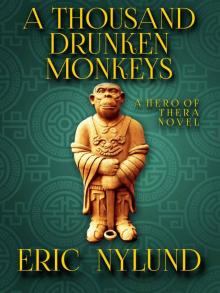 A Thousand Drunken Monkeys: Book 2 in the Hero of Thera series
A Thousand Drunken Monkeys: Book 2 in the Hero of Thera series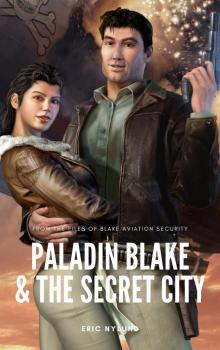 Paladin Blake & The Secret City
Paladin Blake & The Secret City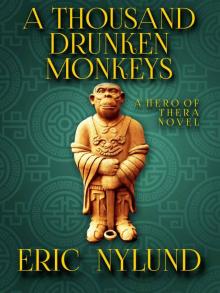 A Thousand Drunken Monkeys
A Thousand Drunken Monkeys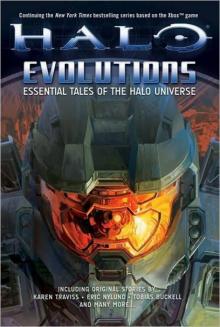 Halo: Evolutions - Essential Tales of the Halo Universe
Halo: Evolutions - Essential Tales of the Halo Universe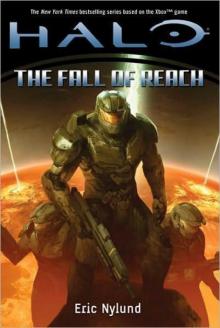 Halo: The Fall of Reach
Halo: The Fall of Reach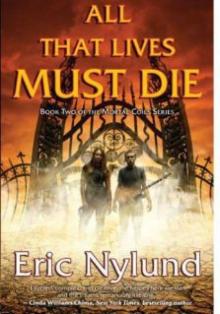 All That Lives Must Die mc-2
All That Lives Must Die mc-2 First Strike
First Strike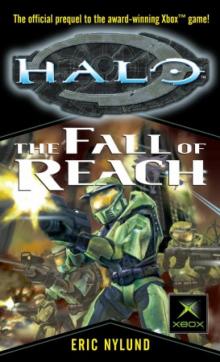 The Fall of Reach h-1
The Fall of Reach h-1